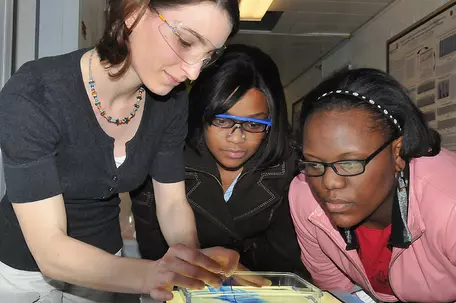Initial Publication Date: September 26, 2012
Women in STEM and Academia
The representation of women in STEM fields and in academia has been growing for decades, but is still far from 50%. The resources below offer perspectives on why this gender gap persists and what can be done about it.
Workshop and Conference Presentations
Women Engineers of Color: How Research Supports Them (PowerPoint 537kB Jul30 12) - This presentation was given by Anne MacLachlan (UC Berkeley) at the the 2008 Cross-Disciplinary Initiative for Minority Women Faculty conference.
Additional Resources on Gender Equity
- STEMming the Tide: Why Women Leave Engineering is a report by Nadya Fouad and Romila Singh, University of Wisconsin-Milwaukee, that summarizes an NSF-funded study to examine reasons behind why women leave or never pursue careers in engineering and samples populations with varying educational backgrounds and career paths.
- To Recruit and Advance: Women Students and Faculty in Science and Engineering is a publication from the National Academies Press that discusses best practices for recruiting and retaining women in STEM disciplines in academia. A free PDF version of the publication is available for download.
- Gender Differences at Critical Transitions in the Careers of Science, Engineering, and Mathematics Faculty is a publication from the National Academies Press that explores the career differences between female and male full-time, tenure-treck, and tenured faculty in STEM field. A free PDF version of the publication is available for download.
- Beyond Bias and Barriers: Fulfilling the Potential of Women in Academic Science and Engineering ( This site may be offline. ) is a publication from the National Academies Press that provides a case for gender equality in engineering entrepreneurship and gives recommended actions for reform to promote gender equality in STEM and entrepreneurship. A free PDF version of the publication is available for download.
- Impostoritis: A Lifelong, but Treatable, Condition is an article by Maria Klawe, President of Harvey Mudd College, from Slate.com that describes and provides tips for coping with 'the imposter syndrome,' a common feeling experience by early career faculty in which they feel like they don't belong.
- Biological, Social, and Organizational Components of Success for Women in Academic Science and Engineering: Workshop Report is a publication from the National Academies Press that documents outcomes of a 2005 workshop that addressed "what sex-differences research tells us about capability, behavior, career decisions, and achievement; the role of organizational structures and institutional policy; cross-cutting issues of race and ethnicity; key research needs and experimental paradigms and tools; and the ramifications of their research for policy, particularly for evaluating current and potential academic faculty." The document consists of three elements: an introduction, summaries of panel discussions including public comment sessions, and poster abstracts and is available as a free downloadable PDF.
- When a Man is Making the Decision Women are Usually Overlooked for Science Awards - This short report describes a study that found that greater diversity (mix of men and women) on an awards board offers a fairer outcome for award winners, whereas all-male boards very likely to choose a male award recipient. A link to the full report is available from this summary.
- How to Judge Whether a Department Will be Supportive of Female Scientists - This article, from Inside Higher Ed, features tips and three personal experiences for determining if a STEM department will be supportive of a female colleague in their department.
- Why Women Leave Academia and Why Universities Should be Worried, an article from The Guardian, looks at reasons why many females in the late stages of their PhD reconsider careers in academia and how this negatively affects universities.
- Every Other Thursday: Stories and strategies from successful women scientists is a book by Ellen Daniell that describes a grassroots support group for women faculty and how they used bimonthly meetings to support one another through discussion and sharing experiences. The book also describes how others can start a similar group.
- The Ivory Ceiling of Service Work looks at factors, particularly increased level of service work, that may be responsible for the difference in promotion rates between men and women from associate to full professor. The article is by Joya Misra, Jennifer Hickes Lundquist, Elissa Holmes, and Stephanie Agiomavritis and is from the January/February 2011 issue of Academe, Vol. 97, No. 1. Academe is a publication of the American Association of Higher Education (AAUP)


![[creative commons]](/images/creativecommons_16.png)